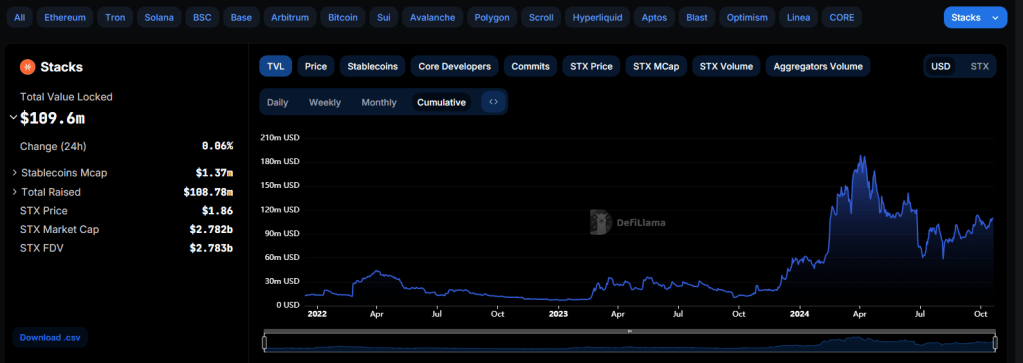Stacks Network, the Bitcoin layer-2, is one of the largest DeFi protocols on the world’s most secure platform. DeFiLlama says the platform over $109 million worth of assets. It continues to expand and improve as decentralized financial services find traction.

Stacks Network Activating Nakamoto On October 29
Over five years after launching, the network is preparing for one of its most important upgrades: Nakamoto. Analysts and platform supporters claim this update would have far-reaching implications, especially for its ecosystem.
The team the latest update would go live on October 29. Most importantly, the transition will introduce features that boost throughput and security.
On scalability, Stacks might be looking to march Ethereum layer-2s that currently process transactions cheaply and can host transaction-intensive dapps.
Once the upgrade activates, Stacks will decouple from the Bitcoin block production speed of roughly 10 minutes. The decoupling will see the platform process transactions within seconds. The change means Stacks will handle more transactions, process them faster, and improve the user experience.
However, the team said this decoupling won’t mean the end of the relationship between stackers and Bitcoin miners. In the team’s view, not only will the collaboration be enhanced, but Stacks as a layer-2 will be more decentralized and, therefore, robust.
Since Stacks is a layer-2, relying on Bitcoin for security, all transactions would still have to be confirmed on the base layer. Accordingly, though its transaction mining will be decoupled from the layer-1, all transactions will be finalized on the Bitcoin mainnet.
This confirmation will be irreversible, leading to better security without the risk of transaction reversals.
STX Moving Inside A Mega Consolidation: Will Bulls Break $2?
As bullish as the Nakamoto upgrade may be, STX, the native token, is flatlining. From the daily chart, the coin is stuck inside a mega consolidation from early July.
STX prices are moving between $1.20 and $2. The token has steadily recovered after crashing in early August, adding nearly 60%. Nonetheless, for the uptrend to take shape and buyers to initiate steps of peeling back March to July losses, there must be a decisive breakout above $2.
If this leg up is with rising volume, it could trigger a wave of higher highs, mirroring those from early Q4 2023 to mid-March. STX may soar to $4 in that event, nearly doubling from September highs.














